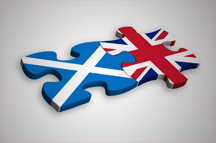 It's just two days or fewer than 48 hours until the polls open for the Scottish independence referendum. Those who've been working on it for the past two years and eight months (yes, that long) see a light at the end of the tunnel, but maybe tinged with a little regret that it's almost at an end now.
It's just two days or fewer than 48 hours until the polls open for the Scottish independence referendum. Those who've been working on it for the past two years and eight months (yes, that long) see a light at the end of the tunnel, but maybe tinged with a little regret that it's almost at an end now.
Opinion polls suggest the race may be too close to call and both campaigns are working within the 3% margin of statistical error which means every single vote counts.
Looking ahead to Thursday, and the announcement of the result expected at breakfast time on Friday, here's a few predictions for what the final 48 hours of #indyref week has in store.
It's now all about Get Out The Vote (GOTV). Don't expect any new information or facts from either side. Instead, it'll be re-enforce and repeat your key messages – the old adage is it's only when you're tired of saying it that the public starts to understand.
GOTV also demands a high turnout. Based on opinion polling the expectation is increasingly of an 80% plus turnout which to put in perspective is more than 50% up on a Scottish parliament election. A turnout of more than 75% would give this result the legitimacy and credibility that the 1979 referendum failed to secure.
 Both sides will invoke the memories of those people no longer with us to make an emotional plea for Yes or No. The legacy of lifelong nationalist Margo MacDonald MSP (pictured left) is still fresh as her husband Jim Sillars takes his MargoMobile around Scotland's streets to drum up Yes votes. On the No side the statue of Donald Dewar, to many the father of Scottish devolution, has become a focal point for campaigners in recent days. If you're undecided then you'll be asked to remember the voices of these and others dearly departed when casting your vote.
Both sides will invoke the memories of those people no longer with us to make an emotional plea for Yes or No. The legacy of lifelong nationalist Margo MacDonald MSP (pictured left) is still fresh as her husband Jim Sillars takes his MargoMobile around Scotland's streets to drum up Yes votes. On the No side the statue of Donald Dewar, to many the father of Scottish devolution, has become a focal point for campaigners in recent days. If you're undecided then you'll be asked to remember the voices of these and others dearly departed when casting your vote.
Yes and No also still have plenty of endorsements up their respective sleeves – celebrities, sports stars, previous political figures who still command respect, and even some serving politicians ready to 'cross the floor'.
Harder to anticipate and to respond to, one of Nassim Nicholas Taleb's "black swan" events unrelated to the referendum may test both sides response to a crisis situation. The death of Diana Princess of Wales weeks before the 1997 devolution referendum saw serious consideration given to postponing that vote, and although it didn't appear to have a direct impact on the result it created significant uncertainty.
The time for positive gamechangers is also past. We're more likely to see a gaffe than a tactical masterstroke now. The principal players will be well aware of this and endeavoring to tread carefully - but someone will still trip up.
 The popular simile has been that indyref has been a marathon rather than a sprint. In reality it's been more like the Tour de France; two professional teams with multi-faceted race strategies, data-hungry analysts scrutinising performance information to glean the slightest advantage, a crowded peleton, individual breakaways, and both sides clicking through the gears as the end is in sight.
The popular simile has been that indyref has been a marathon rather than a sprint. In reality it's been more like the Tour de France; two professional teams with multi-faceted race strategies, data-hungry analysts scrutinising performance information to glean the slightest advantage, a crowded peleton, individual breakaways, and both sides clicking through the gears as the end is in sight.
Brace yourself for a frantic sprint finish like Harrogate…














